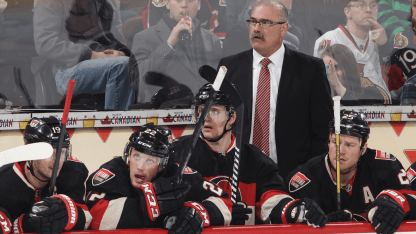The Coaches Room is a regular feature throughout the 2023-24 season by former NHL coaches and assistants who turn their critical gaze to the game and explain it through the lens of a teacher.
In this edition, Paul MacLean, former coach of the Ottawa Senators, who won the Jack Adams Award as NHL coach of the year in 2013, and assistant with the Anaheim Ducks, Detroit Red Wings, Columbus Blue Jackets and Toronto Maple Leafs, looks at how coaches use ice time as a way to motivate players ahead of the Stanley Cup Playoffs.
It’s tough for an NHL coach to motivate his players.
They are limited in some of the things they can do because of the NHL salary cap and no-trade contracts and no-movement contracts, and the various other contractual things that are done above their paygrade.
But as far as the coach goes, the only thing they really have to help motivate their players is the amount of ice time they give them, who they play with, and the circumstances they play in.
It’s something they have to use at the right time because it can be a little bit of a nuclear bomb.
They have to use it at the right time and under the right circumstances, and judging those circumstances can be a tricky part of the equation because of how people are going to react.
At the same time, a coach can’t be afraid to use it, because it’s what they need to do to ultimately decide what’s best for their team. Decisions need to be based on that, not based on what some people want and what some people think should be done.
As a coach it’s difficult to keep everyone happy all the time. I used to tell my assistant coaches to make sure they know the five that don’t like me and keep them away from me and let me know the five that do like me.
It’s going to change and that’s the nature of not only hockey teams, but families and groups that get together; any kind of a team when you’re trying to put things together.
Not everyone is going to be happy all the time, it’s impossible to do, so don’t try to do it. What a coach has to do is always make sure they keep what’s best for the team at the forefront of their mind and make decisions based on that, even though it becomes difficult at times.
It all comes down to communication between the coach and the player, why they’re doing it and how they’re going to do it.
Whether a coach puts a player immediately on the bench because of what he did on the ice or it’s between games where a player’s production hasn’t been what it was, and they need to have a conversation to talk about it.
There’s a huge conversation with any player that a coach is going to sit out. It’s a conversation that sometimes not only involves the player, but the manager, the agent, and the assistant coaches. But at the end of the day, it comes down to the head coach and the player having a discussion on what the player’s needs are and what the coach’s and the team’s needs are, and trying to find a way to get that to be in the right place at the right time so the player can get back on the ice and get producing the way they want to.
This is a time of year where every game is more and more important because a team is one game closer to getting to the playoffs. It’s the coach’s job to make sure the team is playing its best at the right time and the time is when the playoff start.
A coach wants the team to be at its very best for the first game of the playoffs. A coach is monitoring the health of his team and how everyone is getting along and is trying to get them all going at the same time.
Anytime a coach can do that, there are going to be guys that are pleased and guys that aren’t going to be happy with the role they have on the team.
But it’s amazing once the regular season ends and the Stanley Cup Playoffs start how everyone is ready to go and will do what they are asked to do for the group. That’s what it comes down to, that in the playoffs everyone is willing to do what they have to do to make sure the team wins.
It’s a big part of the game especially as the playoffs are getting closer and closer. I think I read something Corey Perry said that the other day, "you have to park your ego."
No one’s above the team, they never should be, but especially at playoff time nobody’s bigger than the team and the guy making the decision is the head coach. Everybody has to listen and go with what he decides, he’s the guy leading the way and if you want to change it, play better.


















